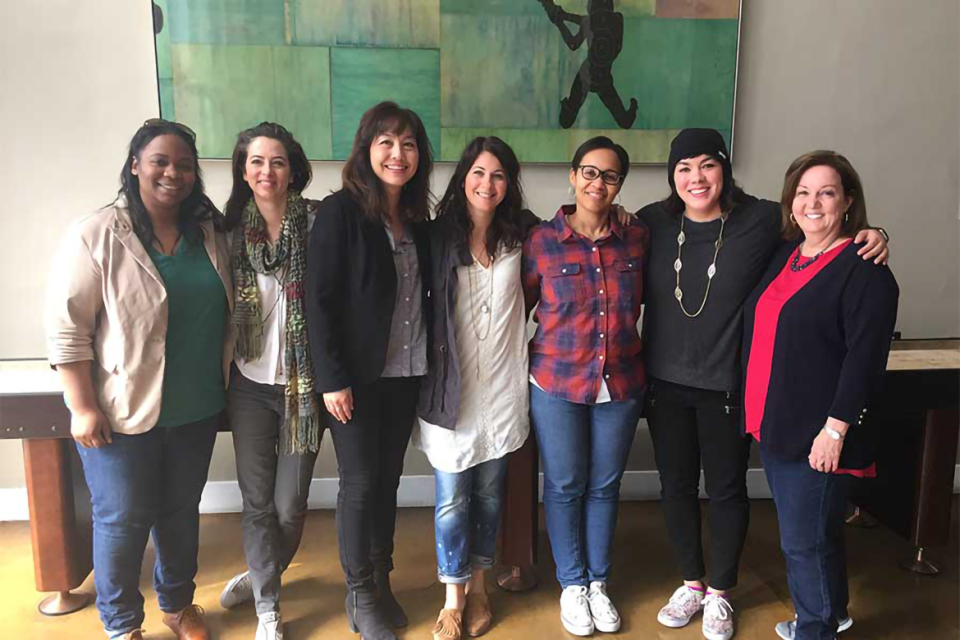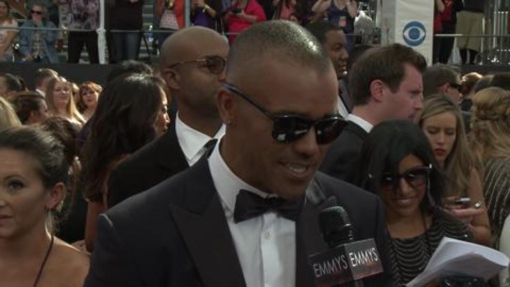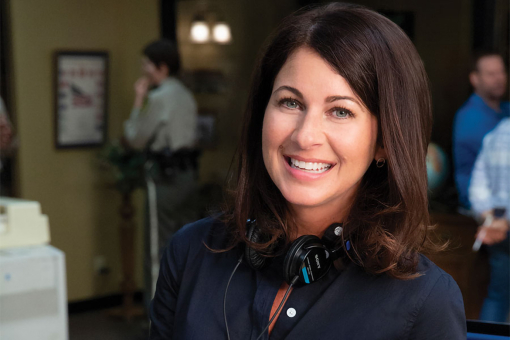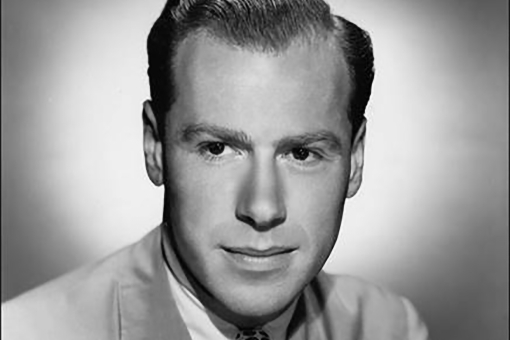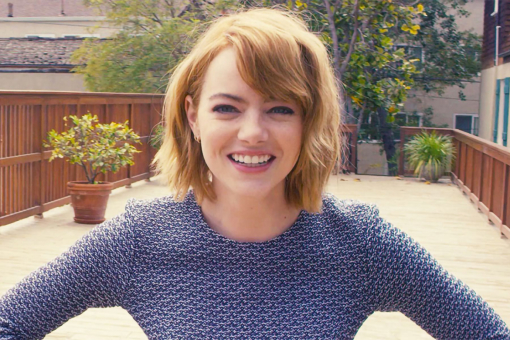In Part One, writers discussed their paths to working on the shows, as well as their approaches. In Part Two, they discussed the process for creating each week’s unsub. In this portion, writers discuss how they write the shows’ good guys, the BAU, as well as how they handle hearing from people who wonder how women can write such dark material.
(In attendance: Erica Messer, executive producer and show runner for both Criminal Minds and Criminal Minds: Beyond Borders (and creator of Criminal Minds: Beyond Borders); Karen Maser, co-executive producer of Criminal Minds, Kim Harrison, producer of Criminal Minds; Daniele Nathanson, supervising producer of Criminal Minds: Beyond Borders; Sharon Lee Watson, co-producer of Criminal Minds; Erica Meredith, and Ticona Joy, staff writers, Criminal Minds: Beyond Borders.)
Coming back to something I mentioned earlier, there are the two sides of this, the bad guys and the good guys. When you’re writing your good guys, what draws you in and what do you like about your BAU guys? How do you keep them coming back to this hard job?
Maser: Like why wouldn’t they quit?
Yes and that they’ve gone through hard things too and come out on the side of good. Is there something reassuring about writing them does that help you along when you get into your worst fears? And also, knowing that Dr. Reid and Derek Morgan are heartthrobs, does it help when you’re writing them as these shining lights of good?
Maser: I’m again the newest on the show and others can talk about it, but I think you’ve played through the years that it does take a toll on the BAU year after year and case after case to do this job, whether on their personal lives or just their psyche itself. It takes a toll being any type of law enforcement – a cop a firefighter – you’re seeing people at their worst but also helping people.
You come across some grisly scenes so where does that all go? But they have each other – it’s like a family and they can rely on each other to get each other’s back. And they are the shining light. You’re rooting for them. They’re smart, they’re dedicated, you want them to find the killer and stop them.
Nathanson: Because in reality we’re faced with a lot of darkness wherever we are, so the idea that our characters - who in the face of seeing darkness day in and day out - continue to strive for the good and continue to strive for their ideals, I think everyone can learn something from that.
You can go down the rabbit hole of darkness and not do anything because you feel overwhelmed by it or you can do what you can to try and bring light to these particular things. So that’s another level of my control of people going, “and now we’re going to take care of you.”
Messer: Especially on Criminal Minds and hopefully on Beyond Borders, the audience knows when they tune in they’re going to be scared. We’re going to take you into the dark and we’re really going to scare you but we’re also going to save you and saving you are the voices and faces of this amazing team.
That’s what’s helped the show stay on as long as it has. That’s the constant. Yes, being scared is a constant but it’s a different fear, it’s a different bad guy, every week. The one constant is the good that you can count on to always be good, which is one of the reasons why we don’t have our heroes flawed.
You’re not going to question, are they going to pull a Jack Bauer and struggle with heroin? No, they’re not. Because there’s enough evil out there, they are good through and through. It doesn’t mean that they’re simple. They’re still complex humans who have different points of view, complex emotions and their own hardships. But they’re not Tony Soprano-type hero or something like that.
Coming from your background of writing more familial dramas, does that family aspect give you some comfort as you write?
Messer: From the very first season, before anyone knew who Matthew Gubler or Shemar Moore were, these guys weren’t our heartthrobs, they were members of the family. Then, thankfully the world saw them and fell in love with them as well.
But it was always a dining room table when we’d go into the roundtable room. It was always the mom and the dad and the brother-sister relationship and the cousin that you loved – Garcia (Kirsten Vangsness) was our cousin pretty much the first season – she was only a recurring character the first 13, she wasn’t yet a series regular.
Because of that, we’ve never done a romance in that team. They’ve had their own romantic things but not within the team because it just feels like that’s when the show changes. And it’s not that you can’t listen to what the fans want and the ‘shippers that are out there, but the minute it becomes real, it’s a different series.
So we’ve pushed the line with Garcia and Morgan, we’ve pushed the line with Hodge and Prentiss – a lot of people wanted them to be together. We’ve always been aware there’s chemistry there and we should play that chemistry but we don’t want them to be couples.
And that keeps them purely good so fans won’t take sides if they did have a falling-out. You can’t get mad that someone didn’t call someone back.
Harrison: Then the focus is on saving lives as opposed to, “You didn’t call me last night.”
Maser: I know they killed another person but where were you?
Meredith: You just touched on it a little but that’s what makes the BAU on Criminal Minds work and hopefully will make it work on Beyond Borders: they’re like the ultimate fantasy. They’re true professionals. They’re sort of like the people we all want to be but first of all, we don’t all look that good and certainly not in dangerous situations.
But they are willing to put aside all of their own fears and their own struggles to actually walk through some crazy environment to save you. That’s a very powerful image especially in today’s world where you can turn on the news and feel really depressed. Here, you have this core group that’s really a family and I think that’s a powerful thing, that they’re coming for you no matter where you are.
That’s cathartic. You want to see that. I want to be rescued by all these amazing people if I’m in danger.
It’s interesting because it takes that helplessness away. When you watch the news you feel helpless but maybe you don’t feel as helpless.
Nathanson: Exactly, that’s the control.
Getting back into the writing of the episodes, I love that you include quotes from literature that are so varied. It made me wonder what kinds of things you read and what you’re reading now.
Watson: I’m reading The Goldfinch by Donna Tartt and one of the things I like about her is she’s a woman who writes male protagonists. The Secret History is one of my favorite books. She’s a phenomenal writer.
Maser: I have books on London, where to go in London for hiatus. I’m reading The Girl on the Train (by Paula Hawkins) which I like because it’s a mystery.
Harrison: I have a bunch of magazines, to be honest with you. I currently don’t have any type of book. I just like it light before I go to bed. And Wendy Williams. You can’t watch the news.
Meredith: I don’t read a lot of crime or crime fiction and if I do it’s not at night. I like a lot of nonfiction biographies. I’m still working my way through Steve Jobs.
I’m reading a book called Gut which is about your microbiomes. Microbiomes are sort of my favorite cutting–edge science. I like cutting edge science, real-life stories. The Immortal Life of Henrietta Lacks, just a really amazing slice-of-life story and crazy for its implications in science.
Joy: I like Greek mythology. I have a book I bought in college that I read and reread constantly because I like it. And I’m about to start Shonda Rimes’ The Year of Yes, see how that goes.
Nathanson: I read a lot of non-fiction too when I’m writing and it’s usually The New Yorker. I’m about to start When Breath Becomes Air (by Paul Kalanithi). I may decide I can’t handle it right now, that’s the issue, anything that’s very moving I’m never sure
He’s the neurosurgeon who died at 36 right?
Nathanson (nods): It’s supposed to be incredible and sometimes I just read things to give me perspective in life. I find that if I get really into fiction, I can’t turn it off. I can’t go to bed, I can’t stop thinking about it so it’s easier for me to just read a non-fiction book that I can put down a little bit.
Messer: I’m more on that route too. This isn’t true but the last book I remember reading is Room (by Emma Donoghue) a couple years ago, which is not possible that that’s the last time I read a book, but it’s one of those things where my husband was just like, “Why are you reading that, why?”
I got through it quickly because it was a page-turner and it has definitely inspired stories here – because it’s also happening, like with the man in Ohio (Ariel Castro, who kidnapped women and trapped them under his house). So I tend to do much lighter stuff – I need it to balance it out.
Brene Brown is a really amazing woman who writes and does podcasts and it’s actually the exact opposite of what we do here, so I listen to her and read that kind of thing.
Maser: What about Serial or Making a Murderer.
Messer: Serial I sort of skipped because I was into Brene Brown when that was big. Making a Murderer I binged because I knew it was going to be a conversation. And Gone Girl I knew, it would be talked about. So that’s a great part of the writer’s room environment is that you get to talk about these things with other like-minded folks.
What do you do to mitigate the creepy aspects of the job, like you’re listening to inspiring women. Do you have habits you go to when you freak yourself out.
Nathanson: Yoga.
Maser: The refrigerator.
Nathanson: That suggests that every time I’m anxious I do yoga which is not the case. I just think, “It would be good if I did yoga right now.” I walk my dog.
Meredith: I like to walk, be active. It clears your head.
Watson: Books and movies that are in a different genre are always good.
Messer: Mine used to be 30 Rock because I wasn’t thinking about the act-outs I was just enjouying it.
Maser: Yes, comedies.
Nathanson: Lots of comedies – 30 Rock, Parks and Rec.
Watson: Food Network or HGTV sometimes.
(collective murmuring around table about a recent episode of Fixer-Upper.)
Harrison: And I always go to Wendy Williams.
Okay, stress relief is apparently important. So, when we first sat down I mentioned how the “women’s fascination with serial killers” is a top Google search. Do any of you have that fascination, or do you see it in your fans?
Maser: We’re not pen pals [with serial killers].
Do you get letters to that effect from women or fans who are into this stuff? Or scary letters?
Messer: I don’t see them anymore. Because when I do it freaks me out. We’re big in prison apparently. Our show is a big hit in prison.
(A lot of “really?”s, etc.)
Messer: Yeah, they used to write letters to A.J. (Cook, who plays Special Agent Jennifer Jareau).
But, really, a huge part of audience are women over 50 years old and I think they do like to be scared, they like to be saved and they like to unravel a mystery. We offer that every week. And hopefully they’re learning something to protect themselves along the way.
Watson: And on the flipside of [the prison fanbase], I feel like I’ve had a number of people say to me, when we’re on location and stuff, “oh my son wants to join the FBI,” or “I want to join the FBI because of this show.” So you have that teen influence, too, people who are inspired to go fight crime and save lives.
Maser: There is a club [online that tracks] when we write about something and it happens in real life…
Messer: Like your Uber driver (referring to “Drive,” an episode of Maser’s where a ride-service driver murdered clients with a homemade guillotine).
Maser: In Michigan, an Uber driver was shooting people in the Cracker Barrel parking lot or wherever and in between that he was picking up rides.
Messer: Are there cameras in all the Ubers?
(talk around the table about not using ride-share services)
Harrison: Listen, I will not travel to another country but I will ride the hell out of Uber.
It’s just the precautions you’re going to take, like if you don’t have 4.8 or higher I’m not getting in the car with you. If you look creepy in your picture, I will not get in the car with you. I will always send my Uber down the street , not in front of my house and I sit behind the driver so we’re gonna both crash this car, you’re not going to shoot me.
And I always have a story. If they ask where I work I say the Bank of America in Glendale. One once said, “Oh I’m there all the time, I’ve never seen you.” So I said I recently transfereed from Toluca Lake.
And I thought, he is asking too many questions. So, as we’re approaching my street, I said there’s my apartment complex and pointed to a building that wasn’t mine. I hopped out of the car, got to the gate and waited for him to leave then ran down the street to my building.
But the next night I’m back in an Uber.
Smart. So is there anything we didn’t touch on? The show’s longevity is so impressive. Do you ever think you’ll need to go do comedy?
Messer: I think we passed that a long time ago. I think I passed that a long time ago.
But there was something that happened last week. Our show participates in a media exchange program which is an international program of showrunners and executives. There were two women in the last group who I met and they said that, especially for the BBC, females don’t write procedurals sort of as a rule there.
I was shocked and said, “why?” And they said that as a rule they don’t want to be scared. And I said I’d like to talk to them. I don’t know if that’s true. It might be a cultural thing, I don’t know.
Maser: Or a sexist thing.
Watson: That’s bizarre.
Nathanson: Is it men saying that?
Messer: Well, the women were passing the message. And they said the women were writing the female driven shows and I thought, that’s interesting.
Maser: And wrong.
Messer: One of the great things about both these writers rooms is there’s a female and male perspective and it shifts things drastically.
I think we’ve all been in rooms where we’re the only woman and it’s a different environment in story telling, not just in your day-to-day environment , in the actual result of the storytelling.
On Alias, there were maybe 12 writers. I had a partner at the time and there were three females in the room. So three women for a female-lead show. And once Sidney stopped being a normal girl and a roommate in addition to spy, I think they always had a female writer but only maybe one.
Do you ever hear that from men - not here but elsewhere, like “should you really be writing that?”
Messer: You don’t hear it here from others. You do get things like, “You write Criminal Minds? But it’s so DARK! What’s wrong with you? what happened in your childhood?”
Nathanson: Yeah, like “ooh, you must be really twisted.”
Messer: It’s a little judgy.
Maser: After they watch your episodes , you all gets texts like” you’re really sick,” “that was really gross,” “how did you come up with that?”
Do you feel judged?
Maser: It’s more like in awe, "that was twisted or sick" and you say, "thank you."
Messer: My mom gets asked, what happened to her?
Nathanson: My mom is scared of it too.
But it all comes the same place of storytelling, imagination, as something quote-unquote female.
Watson: It does, but I want to say ultimately people forget we’re professionals. This is our job. It bothers me that at the BBC they’d say we shouldn’t write this, like women can’t separate their emotions from their jobs. Yes, when I started on this show I had nightmares for the first month but, then guess what? The script is due.
So get your shit together and write the script and you’re able to build the walls or whatever you need to to go ahead and do your job. Yes, the underlying material is dark and twisted but we are storytellers and we can tell many kinds of stories, but this is the job we’re getting paid for and we’re able to be professionals and write these episodes without being overwhelmed by our emotions.
Nathanson: That’s a really good point because that’s what we do for a living, going from show to show. You understand what you have to do, tonally you know what you change, that’s what the skill of the writer and doing this job is. That’s what it is being able to move between tones if you need to, between subject matter if it doesn’t resonate specifically but you make it work.
You find your way in.
Nathanson: Yes, you’re a human being writing about human beings, I think you can find your way in.
To catch up with the first two parts of this story: Part I; Part II

